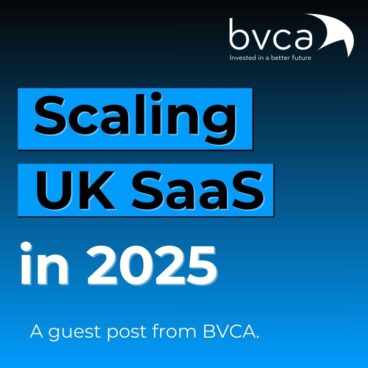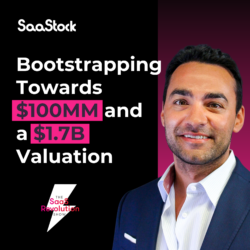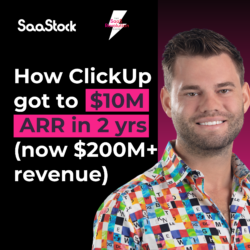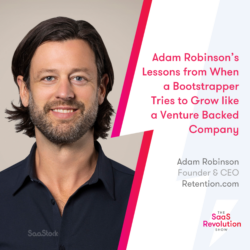This is a guest post written by BVCA Head of Venture Capital Chris Elphik and Senior Venture Capital Executive Baderin Tejuoso.
The UK’s venture capital market is showing positive momentum again, and for founders in SaaS, fintech and AI, that matters. In 2024, VC investment into UK companies hit £9 billion, supporting 378,000 jobs. In total, more than 9,000 UK businesses now have VC backing. As our latest Venture Capital in the UK Report highlights, the real question is how this capital can help product-led, globally ambitious companies scale from the UK rather than feeling the need to relocate for growth.
SaaS is the quiet powerhouse
SaaS doesn’t always make headlines in the way fintech or AI does, but in many ways, it is the backbone of modern business. Whether it is powering payments, helping doctors manage patient data, or giving logistics teams real-time visibility, SaaS is everywhere. It also overlaps with other sectors – most fintech products are SaaS at their core, and many AI applications are deployed via SaaS platforms.
The UK has an established track record here, from early successes like Sage to global growth stories such as GoCardless, Paddle and Multiverse. Yet the pattern is familiar – strong early traction, followed by a crunch at the £20–50 million growth stage. That’s the point where some founders have to look abroad for capital, risking a shift in focus, jobs and ownership.
More firepower for scaling up
That crunch in scale-up funding is why the recent £6.6 billion boost for the British Business Bank (BBB) matters so much. The BBB’s total financial capacity is now £25.6 billion, allowing it to invest around £2.5 billion a year. This is fresh capital that can help turn promising SaaS, fintech and AI businesses into global players without needing to leave the UK.
The new funding will be channelled through a £4 billion Industrial Strategy Growth Capital programme, expected to draw in up to £12 billion of private investment, and a further £2.6 billion targeted at nations and regions. This is a welcome step forward, but public commitments alone cannot solve the UK’s scale-up challenge. The BVCA’s Pensions & Private Capital Expert Panel Report highlights that unlocking domestic pension funds for investment into private capital is essential if we are to close the later- stage funding gap. Here, even a modest reallocation of UK pensions into venture and growth would add billions to the ecosystem, giving SaaS, fintech and AI founders the necessary firepower to scale domestically, while also improving the long-term returns for savers.
Where SaaS, Fintech and AI intersect
Fintech and AI are both key strengths for the UK and both are fertile ground for SaaS models. Fintech continues to attract attention, with around $1.5 billion (Innovate Finance) in investment in the first half of 2025. Many of these companies are SaaS-first, offering banking-as-a-service, automated compliance tools or trading platforms delivered through the cloud.
AI is another growth engine. Many of the most commercially viable AI products are wrapped in a SaaS delivery model, giving customers subscription-based access to powerful tools without the complexity of running them in-house. UK AI startups in fields like legal tech, MedTech and logistics are already building their platforms this way.
For investors, the SaaS model is attractive because it combines recurring revenue, scalability and predictable margins. For founders, it offers the ability to serve global customers from day one.
The people and places that will drive growth
Beyond capital – talent, diversity and geography all matter if the UK wants to be a world leader in SaaS, fintech and AI.
The latest BVCA and Level 20 diversity data shows progress, with women now making up 31% of VC investment professionals and 23% of senior roles. Ethnic diversity is at 20%, though leadership numbers are lower. Inclusion at the investor level means a broader range of founders and ideas get backed, which is vital in fast-moving, customer- led sectors like SaaS. The direction of travel is positive, but more progress is still needed to ensure diversity is reflected not just in entry-level roles, but in senior decision-making across the industry.
Regional funding is also critical. SaaS companies can be built anywhere with good connectivity and talent, so the BBB’s expanded remit to support all parts of the UK is an important step in spreading opportunity beyond the traditional tech hubs, but lasting impact will also need pension reforms to be designed and administered carefully. Consolidation of Local Government Pension Schemes, for example, must not inadvertently shut out smaller private capital fund managers, who are often the ones directing investment into regional businesses outside London and the South East.
What happens next for SaaS, Fintech and AI Founders
With more capital in the system and a government-backed push to support innovation, the conditions for growth are improving. But there are still a few things the ecosystem needs to get right:
- Make it easier for pension funds to back growth capital. Large institutional investors could be a powerful force in keeping UK SaaS and fintech companies growing at home.
- Maintain and expand tax incentives like SEIS, EIS and VCTs, which help early-stage SaaS founders raise their first institutional rounds.
- Ensure funding reaches diverse founders and teams across the country, not just in London. This widens the talent pool and the range of products that get built.
- Keep modernising the legal and regulatory framework so that deal processes, investment terms and IP protections support fast-growing tech businesses.
The opportunity for 2025 and beyond
The UK is well-placed to lead in SaaS, fintech and AI. We have deep pools of talent, a track record of producing high-growth companies and, with the BBB expansion, significantly more capital to keep those companies scaling.
For founders, the takeaway is simple. The infrastructure to build and scale globally competitive SaaS businesses from the UK has never been stronger. The next wave of category leaders could just as easily be founded in Manchester or Edinburgh as in Shoreditch or Canary Wharf.
The capital is here. The talent is here. The market is here. Now it is about execution – turning funding into products, products into customers, and customers into sustainable growth. If we get it right, 2025 could be the year the UK stops losing SaaS scale-ups to overseas markets and starts keeping them here for the long haul.





